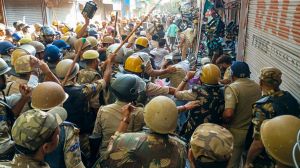Voters have spoken
Every General Election is about a nation talking to itself. In Election 2004 that faceless, voiceless entity called the voter has transmogri...

Every General Election is about a nation talking to itself. In Election 2004 that faceless, voiceless entity called the voter has transmogrified into a veritable demolition machine, which has just laid low some of the tallest figures on the political spectrum. It began with a synthetic shine created in an advertising agency’s studio and ended with the BJP-led NDA being left in the dark. It began with the systematic creation of a “feel good” mood and ended with the ruling coalition feeling the discomfort of rejection. The biggest mistake the NDA made was to have actually believed its own self-serving myths.
It inflated Atal Bihari Vajpayee into a larger than life figure and hoped to continue in power by riding on his shoulders. It mistook one good year of fairly sustained growth as evidence of the country having entered the league of economic superpowers. It perceived brisk cellphone sales and cheap housing loans as symbolising a nation on the move. It believed that it could wish away the post-Godhra communal riots in Gujarat — among the worst in the nation’s history — and move on. It felt it could get away with the numerous scandals that had surfaced with monotonous regularity during its six years of power — whether it was the petrol pump scandal or the Tehelka scam, the cash-on-camera blot or the ministers-milking-PSUs imbroglio — with its image unaffected. Somewhere the NDA, and more specifically the BJP, lost touch with the complex reality of a nation called India and have paid the ultimate price for that folly.
What the election results have just indicated is that even if the NDA was foolish enough to swallow its own myths, voters were not prepared to do so. People speak of the “wisdom” of the voter without quite believing in that wisdom. Jose Ortega y Gasset put it another way in his Revolt of the Masses, where he talked of the world as the sum total of our vital possibilities. Time and again, the millions who make up this country have demonstrated an uncanny ability to perceive their world as the sum total of their vital possibilities. And they also do this by punishing and rewarding those who represent them in the state assemblies and in Parliament through the one means at their disposal — their vote. They showed this ability, most notably, during that famous Janata victory of 1977, when they reminded Indira Gandhi that she had overreached herself by imposing the Emergency with all its attendant draconian measures, and had destroyed some of the foundational principles on which Indian democracy was based. They showed it again by punishing her son, Rajiv Gandhi, in 1989 and dispatching him to the Opposition benches, after having rewarded his party with a landslide victory of over 400 seats just five years earlier.
This time, voters have singled out parties and individuals for their special scrutiny. They threw out three incumbent governments in the process — Atal Bihari Vajpayee’s at the Centre, Chandrababu Naidu’s in Andhra Pradesh, S.M. Krishna’s in Karnataka. Almost to the last man and woman, they rejected AIADMK supremo J. Jayalalithaa’s monotonous attack on Sonia Gandhi’s foreign origins. Even as they humbled senior leaders of the erstwhile dispensation in New Delhi, whether it was a Yashwant Sinha, or a Murli Manohar Joshi; they clearly welcomed youthful promise, even if many of these candidates happened to be the sons and daughters of ministers and chief ministers.
What then are the voters telling their leaders? The temptation to rush to hasty conclusions can sometimes prove to be a trap. There is a perception in the RSS, for instance, that the BJP’s current dilemma has been caused by the fact that it did not follow the Hindutva line rigorously enough. Yet the signals point in the contrary direction. Observe, for instance, the results in Gujarat and the relatively good performance of the Congress in a state that had just over a year ago voted decisively for Narendra Modi’s brand of bigoted politics in the assembly elections. This belies the easy assumption that Gujarat’s voters are religious hardliners. Similarly, it is intriguing, is it not, that the two major metropolises of Delhi and Mumbai — both of them strongholds of the BJP and BJP-Shiv Sena respectively — have voted overwhelmingly for the Congress? The very fact that Sonia Gandhi’s foreign origins did not stir the air despite the best efforts of the BJP indicates that Hindutva as an ideology is on the wane, that emotive politics can take any political party, that needs to pass the electoral test, only that far. It was Vajpayee, more than any other BJP leader, who best understood this. That, unsurprisingly, also accounted for his impressive political popularity.
There is a plethora of data thrown up by this election that is waiting to be absorbed and understood but a quick assessment seems to indicate that voters everywhere have become much more conscious of their rights as citizens and of the power of their votes. People will increasingly deploy the strength that democracy gives them to get better lives for themselves and a better future for their children. Election 2004, then, was about rising popular expectations and the ability — or inability — of leaders to address them.






- 01
- 02
- 03
- 04
- 05

























